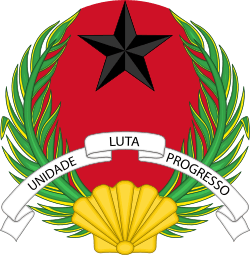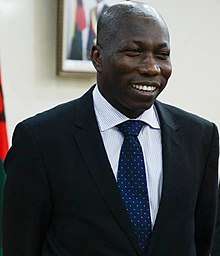2019 Guinea-Bissau presidential election
Presidential elections were held in Guinea-Bissau on 24 November 2019. As no candidate received a majority of the vote, a second round was held on 29 December.[1] Incumbent president José Mário Vaz finished fourth in the first round of voting, failing to progress to the runoff. Umaro Sissoco Embaló won the second round with 54% of the vote.
| |||||||||||||||||
| |||||||||||||||||
| |||||||||||||||||
 |
|---|
| This article is part of a series on the politics and government of Guinea-Bissau |
|
|
Executive
|
|
Legislature
|
|
Judiciary
|
|
|
Candidates
The elections were contested by 12 candidates, including:[2]
- José Mário Vaz, incumbent president. An economist elected in 2014 as the candidate of the African Party for the Independence of Guinea and Cape Verde (PAIGC), but now running as an independent; the first president to complete his five year term in office
- Gabriel Fernando Indi of the United Social Democratic Party, a former football club director
- Umaro Sissoco Embaló of Madem G15, a former prime minister
- Carlos Gomes Júnior, a former prime minister running as an independent
- Baciro Djá of the Patriotic Front of National Salvation (FREPASNA), another former prime minister
- Nuno Gomes Nabiam, an MP from the Assembly of the People United
- Mamadú Iaia Djaló of the New Democracy Party, a former foreign minister.
Results
| Candidate | Party | First round | Second round | ||
|---|---|---|---|---|---|
| Votes | % | Votes | % | ||
| Domingos Simões Pereira | PAIGC | 222,870 | 40.13 | 254,468 | 46.45 |
| Umaro Sissoco Embaló | Madem G15 | 153,530 | 27.65 | 293,359 | 53.55 |
| Nuno Gomes Nabiam | Assembly of the People United | 73,063 | 13.16 | ||
| José Mário Vaz | Independent | 68,933 | 12.41 | ||
| Carlos Gomes Júnior | Independent | 14,766 | 2.66 | ||
| Baciro Djá | Patriotic Front of National Salvation | 7,126 | 1.28 | ||
| Vicente Fernandes | Democratic Convergence Party | 4,250 | 0.76 | ||
| Mamadú Iaia Djaló | New Democracy Party | 2,813 | 0.51 | ||
| Idrissa Djaló | National Unity Party | 2,569 | 0.46 | ||
| Mutaro Intai Djabi | Independent | 2,385 | 0.43 | ||
| Gabriel Fernando Indi | United Social Democratic Party | 1,982 | 0.36 | ||
| António Afonso Té | Republican Party for Independence and Development | 1,061 | 0.19 | ||
| Invalid/blank votes | 11,125 | – | 5,694 | – | |
| Total | 566,473 | 100 | 553,521 | 100 | |
| Registered voters/turnout | 761,676 | 74.37 | 761,676 | 72.67 | |
| Source: CNE, CNE | |||||
Aftermath
Embaló was inaugurated as president in a ceremony in Bissau on 27 February 2020. However, the PAIGC rejected the results, claiming there had been electoral fraud, and submitted a petition to the Supreme Court. Holding a majority in National People's Assembly, the party swore in Speaker Cipriano Cassamá as a rival president. Cassamá resigned after a day, saying he had received death threats.[3]
Embaló appointed Nuno Gomes Nabiam as Prime Minister. However, former Prime Minister Aristides Gomes refused to resign.[3]
References
- "Guinea Bissau presidential election to be held on November 24". AfricaNews. 19 June 2019.
- Deutsche Welle (www.dw.com) (2019-11-02). "Quem são os candidatos às presidenciais na Guiné-Bissau? | DW | 02.11.2019". DW.COM. Retrieved 2019-11-15.
- Guinea-Bissau's Cipriano Cassamá quits amid 'death threats' BBC News, 2 March 2020
